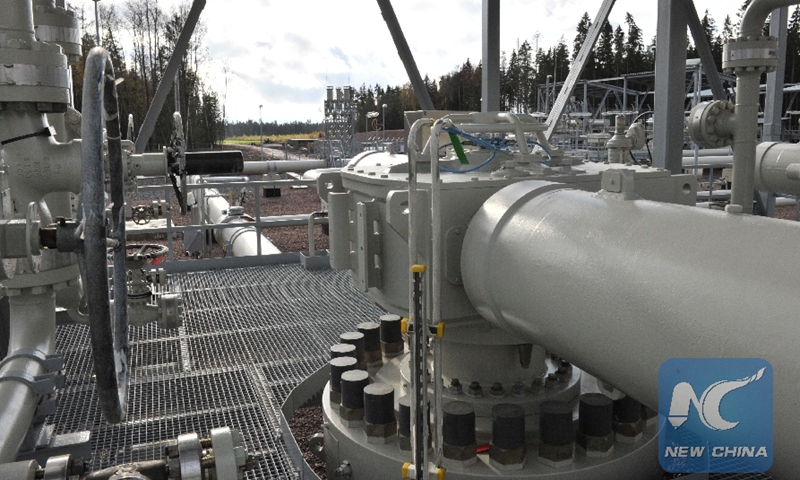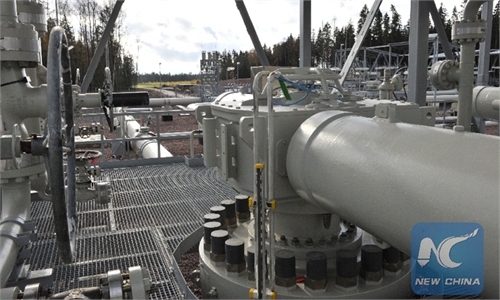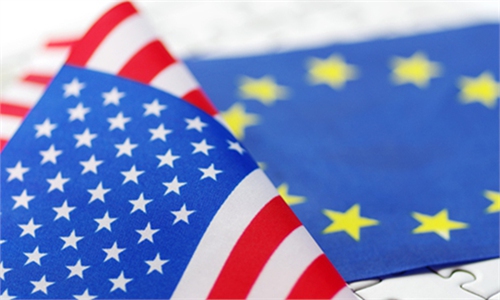
File photo taken on Oct. 8, 2012 shows Nord Stream pipeline equipments before the opening ceremony of the North Stream second gas link in Portovaya bay, some 60 kilometers from the town of Vyborg in northwestern Russia. (Xinhua)
It is a bleak winter for Europe mired in a seemingly endless energy crisis, with gas prices in Europe surging six-fold now. Last week, the European benchmark, the Dutch gas price on the ICE futures exchange, hit a record high.
While Western politicians have frequently accused Russia of withholding gas supplies to Europe over delays in the certification of the Nord Stream 2 pipeline, Russia has always denied such allegations.
Superficially speaking, a point of friction between Russia and Europe has focused on the Nord Stream 2 that was designed to ship Russian gas to Germany, but the project is facing regulatory hurdles after the German new government decides to suspend its certification.
While it may be tempting for some European politicians to blame Russia for not supplying enough gas, figuring out who ends up profiting from the energy crunch of late across Europe may give us some clues as to who is pulling the strings behind the scenes. For Europe, the continuous surge in gas prices this year has hit downstream industries hard, threatening to derail the bloc's economic recovery.
For Russia, the non-operational Nord Stream 2 project which cost Moscow hundreds of billions to build, has to a certain extent weakened Russia's ability and incentives to supply gas to Europe.
It seems that only US LNG suppliers are now happy about the situation. At least 10 American LNG vessels are heading to Europe. And LNG prices in Europe are 13 times higher than in the US, Bloomberg reported.
The US Energy Information Administration projected US LNG exports would reach 11.5 billion cubic feet per day in 2022, becoming the world's biggest LNG exporter and surpassing Qatar and Australia, Reuters reported.
It is no secret to the world that the US government has been obstructing the construction of the Nord Stream 2 pipeline for many years by imposing all types of political and economic sanctions on related parties. The stake is high behind the US' suppression of the project, because the pipeline could enable more cheap gas supplies from Russia to Europe, depriving US suppliers of a prime export market.
Whether the Nord Stream 2 will promote energy cooperation between Russia and Europe, or become a trigger of tensions across the Atlantic will remain to be seen. While the US doesn't really care about Europe's energy security, Washington won't tolerate anything that threatens its energy trade.
What the US government wants is to preserve its global hegemony in the energy sector. The US energy hegemony is one of the important pillars of American global hegemony. So, the US will do everything in its position to ensure global energy supply patterns are in line with its global geopolitical power play. If the energy cooperation between Russia and Europe were allowed to unfold without any complications, it is conceivable that many things would be out of the control of the US.
If anything, the energy crisis is another example demonstrating why Europe needs to have the ability to independently form its own political and economic policies including energy security. Europe needs to be clear that its interests are not the same as the US', and it cannot completely follow the US lead on many issues, or it will end up hurting itself.
Last week, US President Joe Biden signed the so-called Uyghur Forced Labor Prevention Act into law. The anti-China legislation will raise new questions for European companies as to their China-sourcing and will also test the political wisdom of the leaders across the European continent.



